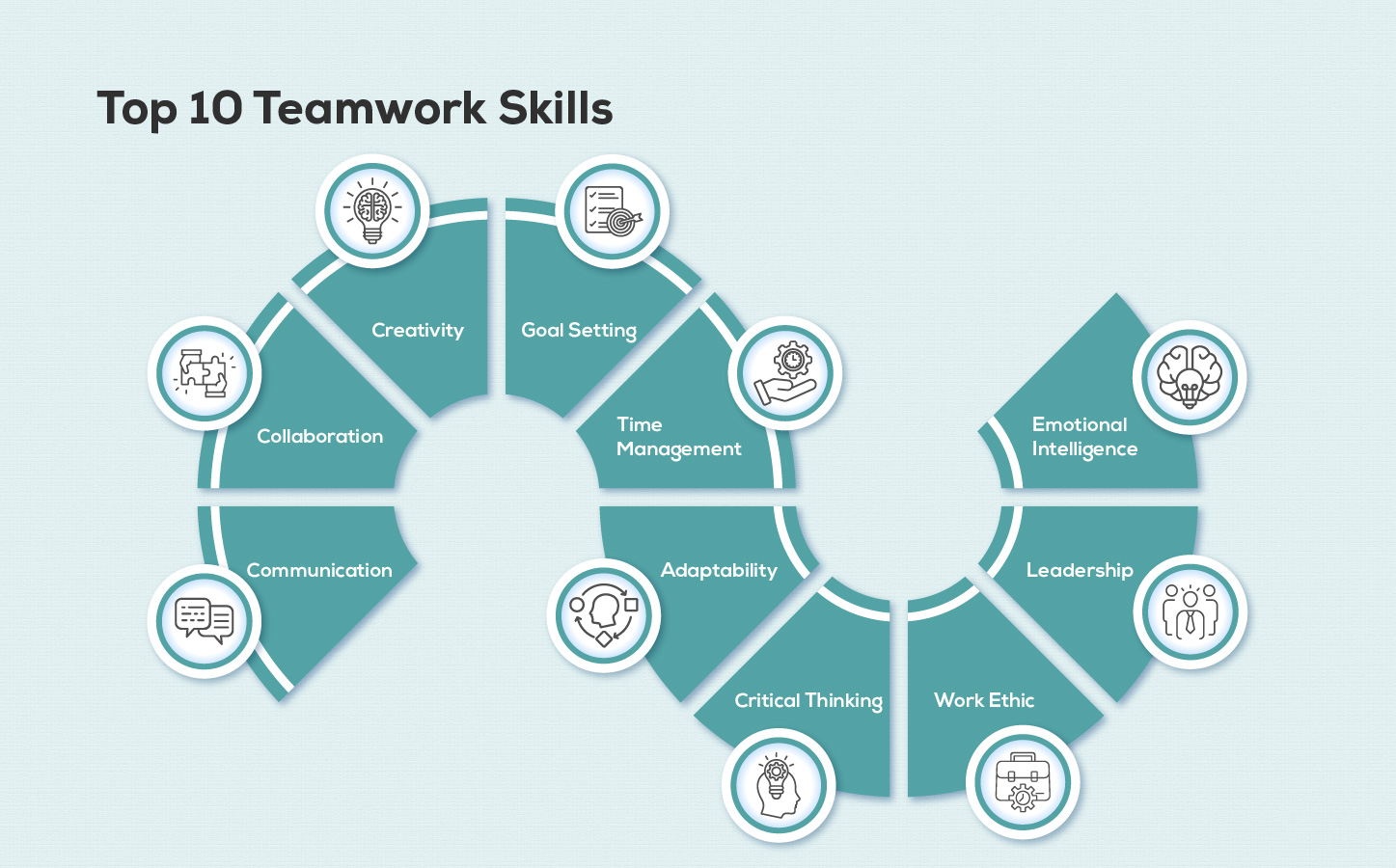“Teamwork is the ability to work together toward a common vision. The ability to direct individual accomplishments toward organizational objectives. It is the fuel that allows common people to attain uncommon results.”
- Andrew Carnegie
Whether it was your group project at school or your college football tournament, you have undoubtedly experienced how teams work. Similarly, workplaces demand the best teams who can work harmoniously under one roof, generating celebrated ideas that bring success and recognition to both the team and the organization.
Teamwork is a powerful tool that brings out the best in each individual. Diverse ideas, strategies, and solutions come to life when talented individuals brainstorm and execute tasks effectively and efficiently. This synergy can transform ordinary efforts into extraordinary outcomes, creating a collaborative environment where creativity and productivity flourish.
However, is it really that easy to work within a team without mastering essential skills? The truth is, effective teamwork doesn't just happen by chance. It requires a set of specific skills that enable individuals to collaborate smoothly and reach their collective goals.
In this article, we will shed light on the most essential skills needed for the optimal functioning of a team and skills that can lead to amazing results. By understanding and developing these skills, leaders can ensure that their team is well-equipped to handle challenges, innovate, and achieve success.
What Are the Essential Teamwork Skills?
While technical skills and knowledge are undoubtedly crucial in the workplace, we cannot overlook the significant role that soft skills play in enhancing these abilities. Soft skills, often referred to as interpersonal or people skills, are essential for any individual to navigate through various tasks within an organization effortlessly. Among these, teamwork skills stand out as a vital subset under the umbrella of Soft Skills.

Teamwork skills are not just about working together; they encompass various other skills that contribute to the effective functioning of a team.
Let us explore these essential teamwork skills that help us navigate and excel in collaborative settings.
1. Communication: Communication is not merely about speaking or showcasing one’s fluency in a language; it is about conveying messages that are sensible, meaningful, and tailored to the context, situation, and audience. Effective communication is crucial for achieving success in business environments. It involves not only the ability to articulate thoughts clearly and compellingly but also the ability to understand the needs of others and respond to feedback appropriately. Employers highly value individuals who can build professional relationships with colleagues, as this is essential for effective teamwork.
A team often consists of both introverts and extroverts. Extroverts may find it easy to express their thoughts and ideas, sometimes to the extent of dominating conversations. This can lead to an imbalance where the voices of introverts or quieter team members are not heard. It is essential to ensure that everyone in the team has an opportunity to contribute, creating an inclusive environment where no one’s voice is overshadowed.
Here are some important aspects of communication skills:
- Verbal Communication: The ability to convey information clearly and effectively through spoken words, ensuring that the message is understood by all team members.
- Non-Verbal Communication: Understanding and utilizing body language, facial expressions, and gestures to complement verbal communication and enhance message delivery.
- Written Communication: Crafting clear, concise, and well-structured written messages, which are essential for documentation, emails, reports, and other business communications.
- Active Listening: Engaging fully with the speaker, understanding their message, and providing thoughtful feedback. This ensures that communication is a two-way process.
- Presentation Skills: The ability to present information in an engaging and organized manner, whether in meetings, presentations, or public speaking situations.
2. Collaboration: Just like a puzzle takes each piece to complete a picture, collaboration requires the collective effort of different minds working towards a shared goal. In a professional environment, individuals who can effectively collaborate with others are more likely to contribute towards organizational success.
To collaborate successfully, team members must understand their individual roles, responsibilities, and deadlines, as well as how their contributions fit into the larger project. This broader focus brings in a sense of accountability and empowers individuals to find solutions and proactively address challenges as they arise.
Effective collaboration requires open communication, active listening, and mutual respect among team members. By leveraging each other's strengths and expertise, teams can achieve greater productivity and success.
3. Creativity: As the work dynamics constantly evolve, applying obsolete methods to tasks or projects may not give the desired results. Today, there is a huge demand for thinking outside the box, and as a team, each one must come up with interesting ways to tackle challenges and innovate. Creativity within the team is paramount in this regard, as it sparks fresh ideas and encourages unconventional thinking and problem-solving approaches. In a collaborative environment where creativity is encouraged and valued, leaders can tap into their members' collective intelligence and imagination, leading to the development of best solutions and discovering new opportunities.
4. Goal Setting: Individuals cannot go in different directions when working in teams. We have been talking about a shared goal, therefore it is paramount that the team coordinates well with one another. Setting clear and achievable goals is essential to ensure everyone is aligned and working towards the same objective. When everyone is on the same page regarding the team's goals, it becomes easier to prioritize tasks, allocate resources efficiently, and overcome obstacles together. Ultimately, goal setting empowers teams to focus their efforts, maximize productivity, and achieve remarkable results collaboratively.
5. Time Management:Followed by goal setting is time management, a critical aspect in ensuring that the team stays on track towards achieving its objectives. Effective time management involves prioritizing tasks, setting deadlines, and allocating resources efficiently to optimize productivity. By establishing timelines for each stage of the project and regularly monitoring progress, teams can identify potential bottlenecks early and take proactive measures to mitigate them. Additionally, effective time management allows team members to balance their workload, ensuring that they allocate sufficient time to each task without feeling overwhelmed.
6. Adaptability: Adaptability holds significant importance within team dynamics. A team member possessing this skill demonstrates the ability to flexibly adjust to evolving circumstances, such as acquiring new skills and technologies to maintain relevance in the workplace. Given the inevitability of unforeseen challenges, adaptable employees enable organizations to swiftly recover from setbacks. Moreover, they possess the capacity to swiftly distinguish situations and tailor their strategies accordingly, facilitating effective adaptation based on the prevailing circumstances.
7. Critical Thinking: Just like creative thinking plays a crucial role, critical thinking skills are equally necessary to make informed decisions. By employing this skill, the team members can assess available options and anticipate potential outcomes before reaching a conclusion. Critical thinkers can analyze arguments, identify strengths, weaknesses, and flaws in reasoning. They actively consider diverse perspectives, enhancing their capacity to discern both short-term and long-term consequences of their decisions. Furthermore, critical thinkers excel in pinpointing the root cause of problems and developing multiple solutions to address them meritoriously.
8. Work Ethic: Work ethic is essential for team members as it encourages reliability, accountability, and a strong sense of responsibility. Team members with a strong work ethic are committed to maintaining punctuality, consistently meeting deadlines, and producing high-quality work. This commitment not only enhances individual performance but also positively impacts the entire team’s productivity and morale.
Team members who take pride in their work are more likely to seek opportunities for learning and development, which can lead to creative solutions and better problem-solving capabilities. Moreover, a strong work ethic is fundamental to achieving collective goals and ensuring long-term success for the team and the organization.
9. Leadership: Leadership within a team is crucial for guiding and motivating members to reach common goals. Good leaders give clear direction, encourage open communication, and resolve conflicts fairly. They empower team members by sharing responsibilities and supporting their growth. By keeping morale high and showing integrity and flexibility, strong leaders create a united and productive team, helping everyone succeed together.
10. Emotional Intelligence: While working in teams, it's common to face disruptions like disagreements or conflicts among members. To prevent problems, each one of them needs to recognize and understand their emotions, as well as those of others. This is where emotional intelligence comes in. Developing emotional intelligence helps improve communication and resolve conflicts more efficiently. By building trust and strong relationships within the team, emotional intelligence creates a supportive environment where everyone can work together smoothly toward common goals.
Strategies for Effective Teamwork

Effective teamwork is key to success in any organization, boosting innovation, productivity, and collaboration. However, applying teamwork skills well needs active leadership and effort. Leaders are crucial in building a team-focused culture and helping members work together effectively. Here are some strategies to promote and strengthen teamwork skills in teams.
1. Facilitate Communication: Leaders can enhance communication by creating an open and welcoming environment where everyone feels comfortable sharing ideas. This involves setting up clear ways to communicate, encouraging active listening, and being transparent.
For example, a leader can hold regular team meetings where each member talks about their progress, challenges, and suggestions. During a weekly meeting, the leader can have a roundtable discussion, allowing every team member to share updates and concerns.
2. Encourage Collaboration: Clear roles and responsibilities are crucial for effective collaboration. When everyone knows who is responsible for what, it eliminates confusion and allows team members to work together easily. Using a shared document and holding meetings to clarify roles ensures all tasks are covered and helps team members understand how their contributions fit into the larger project. This transparency facilitates better coordination and support within the team.
3. Enhance Creativity: Creating opportunities for collaboration through team projects, cross-functional initiatives, or brainstorming sessions is essential. This provides them the freedom to explore new ideas, embrace diverse perspectives, and creative solutions.
A leader can organize brainstorming sessions where all ideas are welcomed without immediate criticism. For instance, during a product development meeting, the leader can ask each team member to propose unique solutions, ensuring that no idea is dismissed prematurely. This practice not only sparks creativity but also makes team members feel valued and heard, leading to more innovative outcomes.
4. Set Clear Goals: Leaders can improve goal setting by making sure everyone understands the goals and their role in achieving them. This includes setting SMART goals (Specific, Measurable, Achievable, Relevant, Time-bound), giving regular feedback, and encouraging teamwork. For instance, in a team meeting, a leader can guide a discussion to set key milestones and deadlines. This helps each team member know their part in reaching the shared goals. Clear expectations and timelines help the team work together better and achieve success.
5. Enhance Problem-Solving Skills: Leaders can boost problem-solving skills by encouraging analytical thinking and teamwork. Introducing a "problem of the week" challenge, for example, allows team members to collaboratively tackle specific issues. By presenting scenarios, such as a project falling behind schedule, and guiding the team to brainstorm and assess solutions, leaders help develop problem-solving abilities and enhance collaborative efforts.
6. Foster Strong Work Ethic: Demonstrating a strong work ethic through one's actions sets a powerful example for the team. Showing dedication, punctuality, and a commitment to high standards encourages others to adopt similar behaviours. If leaders consistently meet deadlines and go the extra mile to ensure quality work, they set a standard for the entire team. For example, when working on a critical report, the leader stays late to perfect the final details, demonstrating the importance of diligence and responsibility. This behaviour inspires team members to also put forth their best effort and take pride in their work, promoting a culture of excellence and accountability.
7. Cultivate Empathy: Empathy (Hyperlink Nivedas’ Mindful Leadership article) is essential for creating a strong, supportive team. Leaders can cultivate empathy by encouraging team members to understand and appreciate each other's feelings and viewpoints. This can be achieved through activities that promote active listening and open dialogue. A leader might arrange a team-building exercise where members share personal stories or challenges. This helps team members relate to one another on a personal level and develop mutual understanding. Additionally, leaders should demonstrate empathy by showing genuine care for team members' concerns and providing support when needed. This approach nurtures a compassionate and cohesive team culture.
8. Offering Support and Feedback: Providing constructive feedback and support helps team members develop their teamwork skills. For instance, coaching or mentoring individuals who may need assistance in improving their collaboration abilities can be very effective.
9. Promote Diversity and Inclusion: Embracing diversity and inclusion within the team ensures that all members feel valued and respected for their unique perspectives and contributions. Making sure everyone feels like they belong and are part of the team helps everyone work together better.
10. Regular Assessments: Regularly assessing the team's performance in applying teamwork skills and making necessary adjustments is important. Gathering feedback from team members, identifying areas for improvement, and implementing changes can enhance teamwork effectiveness.
These are some of the ways leaders can be instrumental in making their teams work seamlessly and harmoniously.
Conclusion
Mastering essential teamwork skills isn't just about working together; it's about building bridges, nurturing understanding, and achieving greatness as a unified force. By communicating openly, helping one another, welcoming different perspectives, and being flexible, teams can tackle anything. Remember, the strength of a team lies not just in its members, but in the bonds they forge and the shared goals they pursue. So, let's continue to cultivate these skills, and empower each other because when we work together, amazing things can happen!



